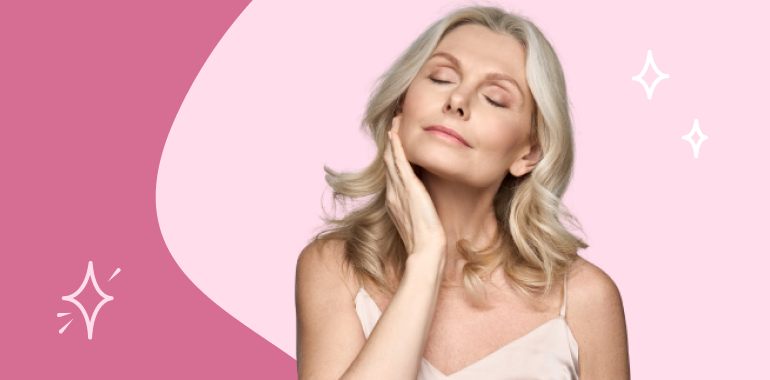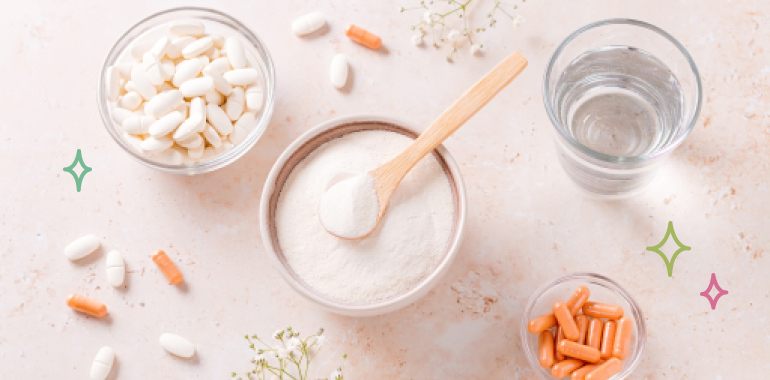Table Of Contents
Introduction: What Exactly Is Self-Care For Women Over 40?
For women over 40, self-care is often a popular topic of conversation. It’s easy to talk about what we sometimes perceive as evident—like exercising regularly or getting enough sleep—without untangling and understanding the complexities of self-care in this stage of life. In addition, women over 40 often juggle several roles: mother, career woman, wife, friend, daughter…the list goes on!
Given our hectic schedules, it can be challenging to prioritize self-care. As a result, we’ll look at some tried-and-true strategies for women over 40 to take better care of themselves without sacrificing other aspects of their lives today.
We’ll also talk about how focusing on health from head to toe can affect wellness on all levels — physically and mentally. Ready? Let’s get this party started!

What Happens to Your Body When You Reach the Age of 40?
Turning 40 could be one of your life’s most unique experiences! There’s loads of scientific evidence supporting this idea. For example, a report from The Economist suggests that reaching the age of forty can increase overall happiness and life satisfaction for many Americans.
And it makes sense. By the time you hit 40, you’ve likely established yourself in your career, found a special You’ve got someone to spend your life with, and you may even be experiencing the joys of family life.
Also, read – How to Lose Weight With PCOS
Aside from happiness and life satisfaction, there’s something else. When you reach 40, your body undergoes exciting changes beyond a slower metabolism. Trust us.
So if you’re curious to learn a few things that occur within your body and physique in your middle-aged years, keep reading!
Your Muscle Mass Begins to Decrease
As we age, our muscles become weaker and lose mass, a phenomenon called sarcopenia. It’s a natural part of life that affects both men and women. According to research from Harvard, men typically experience a decline of about 3-5% in muscle mass per decade starting from around the age of 30. However, the noticeable effects of sarcopenia usually become more apparent around age 40.
One practical approach is progressive resistance training (PRT), which involves gradually increasing the intensity and volume of your workouts as you become stronger.
Your Hormones Start to Alter
Let’s discuss a common concern many people have as they age: decreased libido. It turns out that hormonal changes play a significant role in this, usually starting around 40 for both men and women. As estrogen and testosterone levels decrease, it can affect your sexual desire and performance.
When you reach 40, your hormones gradually decline, lasting 10-15 years. This decline can cause difficulty sleeping, weight gain, brain fog, irritability, anxiety, low libido, lack of motivation to exercise, and even an unplugging from your body & mind.
Something Strange Is Happening to Your Brain
Oh, the quirks of the aging brain! It’s quite the character once you hit the fabulous age of 40. Suddenly, you find yourself in hilarious situations like forgetting directions, walking into a room only to blank out on why you’re there, and even drawing a complete blank when trying to recall your own child’s name (“Hey, you! Take out the trash… um… you know who I mean!”).
But here’s the kicker: your brain resembles the bottom of your purse, with lost pen caps and a congealed, mysterious mess of unidentified items.
Also, read – Menopause Diet: Foods that Help with Hot Flashes
Body Changes in a 40-Year-Old Woman and the Importance of Self-Care
At around 40, many women experience specific body changes. A significant change that occurs naturally in a woman’s life is the start of perimenopause, which leads to menopause. During this time, your hormone levels fluctuate, which can bring about many symptoms, such as hot flashes, irregular periods, mood swings, and changes in libido. Embracing these changes and seeking support from healthcare professionals can help you navigate this phase gracefully and efficiently.
It’s also common to pay attention to metabolism. Managing weight becomes more challenging as we age due to our slower metabolism. However, with mindful eating habits, regular physical activity, and focusing on nourishing your body, you can maintain a healthy weight and feel your absolute best.
Now, let’s talk about self-care—the magical ingredient that can make all the difference in your 40s.
- Self-care is prioritizing your well-being and nurturing yourself physically, mentally, and emotionally. It’s about carving out moments for relaxation, engaging in activities that bring you joy, and creating healthy boundaries to preserve your energy.
In your 40s, self-care becomes even more critical because life tends to get busier with various responsibilities and commitments. When you care for yourself, you become the best version of yourself, enabling you to be there for those you care about. Whether enjoying a rejuvenating bath, practicing mindfulness and meditation, pursuing hobbies, or seeking support from loved ones, self-care is a powerful tool for maintaining balance and inner harmony.
Vitamins Required by a 40-Year-Old Woman
Imagine vitamins and nutrients as your army, ready to defend your body against age-related ailments. Building this army becomes crucial as you hit your 40s, and the best way to do it is through a healthy, well-rounded diet.
At 40-plus, your body changes. Muscle mass begins to decline, weight management becomes more challenging, and menopause may be on the horizon or have already arrived. The risk of chronic diseases like cancer, heart disease, and diabetes increases. That’s why adjusting your battle plan and giving your body the support it needs is necessary.
Getting enough vitamins and nutrients is one effective solution. So, let’s look at the best vitamins and supplements for women over 40.
For Improved Metabolism & Energy
Let’s talk about the great B vitamins and how they help energize your body! These little powerhouses, including folate, pantothenic acid, niacin, biotin, riboflavin, thiamin, B12, and B6, play a vital role in converting food into energy. But here’s the thing: if you don’t get enough of these B vitamins, it can leave you feeling sluggish and low on energy.
As we get older, our bodies have difficulty absorbing B12, which makes it essential to ensure that we consume enough of this necessary vitamin. In addition, if you are a vegetarian or vegan, you may be more susceptible to B12 deficiency because it is primarily found in animal-based sources.
If you’re not getting sufficient B12, you may experience the following:
- weakness,
- a swollen or sore tongue,
- poor memory,
- difficulty thinking,
- numb or tingling extremities,
- and impaired balance.
Paying attention to these signs and taking proactive steps to address any potential deficiencies is crucial.
Also, read – How to Slow Aging with Fasting?
For women, it’s recommended to aim for a daily intake of 2.4 milligrams of B12.
Vitamin can be found in animal-based foods such as tuna, beef, cheese, milk, salmon, trout, clams, and beef liver. Some cereals are also fortified with B12. If you choose to supplement, select a high-quality supplement that includes this vital vitamin.
For Bone Strengthening
Let’s spotlight the incredible vitamin D and its importance for women in their forties, especially when preventing osteoporosis. Women are more susceptible to this bone disease because estrogen levels in the body begin to decrease as they reach their forties.
A powerful duo can come to the rescue! Calcium is an essential mineral that plays a significant role in maintaining the strength and health of our bones and teeth. Our body continuously breaks down and builds up bone tissue using calcium stores. If we don’t have enough calcium, it can result in bone loss and weakened bones.
Now, here’s where vitamin D steps in as the superhero. It’s crucial in helping the body absorb and utilize calcium effectively. Our bones can become brittle, misshapen, and thin without adequate vitamin D. That’s why it’s vital to ensure you have sufficient vitamin D and calcium intake to keep your bones strong and healthy.
Also, read – Effective Tips to Lose Fat On Your Face
It is recommended that women over the age of 40 consume 1,000 milligrams of calcium and vitamin D per day.
- You can find calcium in various sources such as dairy products, fish with bones (sardines or salmon), and fortified foods.
- You can obtain vitamin D from fatty fish, egg yolks, fortified foods, or supplements.
For Your Skin & Hair
You might have already noticed some transformations in your 20s and 30s, but once you hit your 40s, these changes can become more apparent.
If you find yourself deficient in specific nutrients, it may manifest in your skin appearing pale and dry, and you might experience hair loss. That’s where vitamins and minerals come to the rescue! They play a crucial role in promoting cellular turnover, which directly affects the health of your hair and skin.
Two key players in hair health are vitamin D and iron. Lacking certain nutrients has been associated with hair loss. Vitamin C is crucial as it helps the body absorb iron.
Consuming 75 milligrams daily is recommended to ensure you receive enough vitamin C.
Include broccoli, citrus fruits, peppers, Brussels sprouts, and strawberries. These foods contain vitamin C to support skin health.
Also, read – The Best Food To Increase Libido Female
How Much Protein Should a 40-Year-Old Woman Consume?
Protein is involved in building and repairing tissues, supporting muscle health, boosting your immune system, and even contributing to healthy hair and nails. So, let’s dive into how much protein you should aim for.
Generally, it’s suggested that women aged 40 and above consume about 0.8 grams of protein per kilogram of body weight.
However, some experts believe older adults may benefit from slightly higher protein intakes to support muscle maintenance and overall well-being.
To put it into perspective, if you weigh around 68 kilograms (150 pounds), a good target would be consuming approximately 55 grams of protein daily.
- Animal-based sources like lean meats, poultry, fish, eggs, and dairy products are protein-rich.
- If you’re a vegetarian or vegan – turn to plant-based sources such as legumes (like lentils, chickpeas, and black beans), tofu, tempeh, seitan, nuts, seeds, and whole grains like quinoa.
Also, read – Natural Way to Increase Metabolism After 40
How to Implement Intermittent Fasting as a 40-Year-Old Woman
Fasting for 40-year-old women can seem daunting. After all, your age brings a host of complexities and changes you may not have experienced when younger. However, don’t be intimidated by fasting! It’s a very healthy practice; with some simple steps, you can make it fit into your life without any disruption or challenge.
First, you mustn’t push yourself too hard; if you start feeling tired or depleted, stop doing until you feel better. It helps if you also take the time to eat quality foods before beginning a fast. Another critical factor for 40-year-old women is to be mindful of their hydration level during a fast.
Additionally, consider incorporating some form of light exercise throughout the fast to help keep your circulation up and stimulate digestion. Walking or stretching are good options since they require less energy or exertion.
Finally, pay attention to how you’re feeling while fasting. If you start feeling unwell or overly tired at any point, stop the fast and take a break. Fasting should be a positive experience, so practice self-care and don’t push yourself too hard.
Proven Strategies for Starting a Skincare Routine for a 40-Year-Old Woman
Cleansing: Cleansing removes dirt, oil, and impurities, allowing your skin to breathe and absorb subsequent products effectively.
Hydration: Hydrating your skin is crucial for maintaining its elasticity and smoothness. Look for moisturizers rich in antioxidants, hyaluronic acid, and other nourishing ingredients.
Sun Protection: It’s vital for preventing premature aging and reducing the risk of skin cancer. Make sunscreen with a minimum SPF of 30 a non-negotiable step in your routine.
Targeted Treatments: Incorporate targeted treatments to address specific concerns. For example, if you’re concerned about fine lines and wrinkles, look for products with retinol or peptides.
Eye-Care: Invest in an eye cream or serum to target fine lines, puffiness, and dark circles.
Also, read – The Female Stages of Weight Loss

6 Time Management Tips for a 40-Year-Old Woman
1. Start with a Morning Ritual
Begin your day with a routine that sets a positive tone. It could include meditation, gentle stretching, journaling, or enjoying a nutritious breakfast. This quiet time can help you center yourself and prepare for the day ahead.
2. Break Tasks into Manageable Chunks
When faced with big tasks, dividing them into smaller, more achievable steps can be helpful to avoid feeling overwhelmed. This approach will make them less daunting and help you stay motivated throughout the day.
3. Practice Time Blocking
Allocate specific blocks of time for different activities. For example, dedicate time for work, family, self-care, and leisure. By creating these boundaries, you can ensure that each aspect of your life receives the attention it deserves.
4. Avoid Multitasking
Contrary to popular belief, multitasking can often decrease productivity and increase stress. Instead, concentrating on a single task and giving it your undivided attention is best. This approach leads to better results and more efficient use of your time.
5. Take Breaks and Practice Self-Care
Schedule regular daily breaks to rest and recharge. Partake in activities that bring you happiness and aid in relaxation, such as taking a brief stroll, practicing deep breathing exercises, or savoring a warm cup of tea.
6. Embrace Technology & Tools
Utilize technology and productivity tools to streamline tasks. Explore productivity apps, calendars, and task management tools.
Finally, maintain your mental health and strike the proper balance.
You can prioritize your needs and goals as a woman over 40 while caring for others. It’s an absolute necessity to supplement self-care and caring for others. Taking care of yourself doesn’t have to be complicated; it can simply mean pausing each day for something as simple as a hot bath or reading something light and enjoyable – whatever helps your mind feel calm and balanced.
Remember that doing something as simple as taking a break brings us peace and relaxation, allowing us to serve those around us better!
Carmen Van Rensburg is an Accredited Exercise Physiologist with a wealth of experience, spanning over 12 years in the field. She has demonstrated expertise in devising exercise-based rehabilitation services that promote wellness and recovery. Her instructive techniques in conducting safe and effective exercise sessions have significantly aided individuals in various areas. These include weight loss, improving muscle strength, optimizing cardiovascular function, enhancing body composition, increasing flexibility, and facilitating recovery from chronic diseases, disabilities, and injuries.









